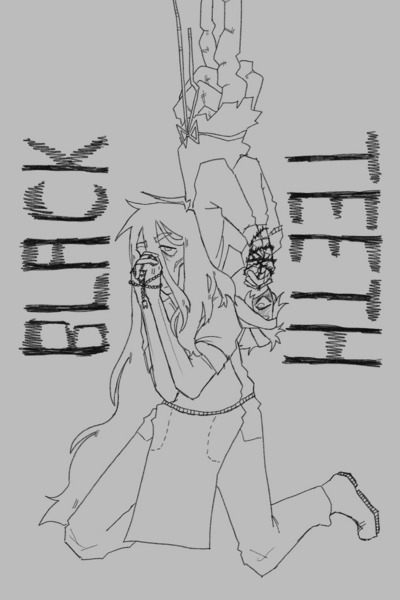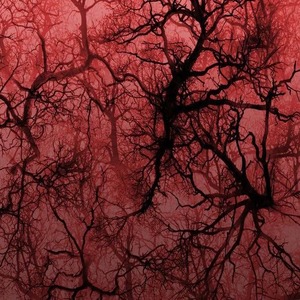This chapter contains the following trigger warnings:
Graphic descriptions of gore
Graphic descriptions and the ingestion of rotten food (and insects)
Insects (flies and maggots)
Self-Victim Blaming / Guilt
Implied suicidal ideationPlease note that Malin's feelings about himself (ie, the victim blaming) do not reflect my opinion of people in or escaping from abusive situations. You deserve to heal and to be safe!
Sunlight tripped, stumbled, and fell into the hallway when Malin awoke. He groaned, turned over on the couch, and tugged at the unfamiliar blanket covering him. An acrid smell danced over the remains of his nose. He blinked. The small motion would have almost dragged him back into sleep if it wasn’t for the sandwich and its subtle smell–Malin figured the subtlety was more from his lack of a nose than the quality of the sandwich itself. The bread bloomed with vivid blue-green tones. The meat–maybe at some point deli ham or turkey–pulsed and buzzed with flies. A whisper of a lettuce leaf drooped down the blackened cheese slice. Malin gave a thin smile towards it. Part of him wanted to see what happened if he ate it. God, his stomach wanted it. Maybe this would be his shortest round yet. And if all went well, a little vomit or stomach troubles later was nothing compared to the idea of food. Perhaps in the middle of the rottenness, some clean core could be ripped out and swallowed like a star. The flies inspected him with a flurry of nonstop noise.
When Malin lifted his head, the blackened bloodstain on the couch tried to keep him tethered. He tore himself away from it. Flies flitted away, almost indistinguishable from the dust in Malin’s unfocused vision. The gauze over his left eye hung loose, bloated with blood, and allowed the pin pricks of cold air to seep inside. His head felt like a spinning globe. Hunger tore at his stomach and kept his eyes on the sandwich as he tried to ground himself. The air conditioner continued to wheeze, but no other sounds of life came from anywhere in the house. Malin reasoned he must have been asleep for at least a few days, given the dire state of the food–and the room at large, he realized. Or maybe Machiavelli had chosen the worst of the worst for the sandwich, leaving him to rot. He had seen the doctor’s eyes flicker with disgust. It was only a matter of time until his actions bled with it. Dust particles whirled in the sunlight streaming in from another room. No lights were on, or at least none that Malin could see.
His hands reached towards the sandwich.
The mold spots puffed, spilling out their colors into the air. A fattened maggot dripped onto the plate with its siblings tumbling after it. The stench hit the roof of his mouth. Curdled milk, the iron of blood, and the stuffy, earthy scent of the mold beckoned for bile and tears. Malin did not ask for food, he reminded himself. He only asked to stay. And if this was to be his first or final meal of this circuit, then so be it. He had walked into this. He had continually walked into this, hadn’t he? Door after door after door after door. A fresh stream of pus dripped from his empty eye socket, as if to share the duty of tears with the other eye. But he smiled. Malin’s upper jaw sat suspended above the sandwich, a bridge about to collapse. He closed his eyes and began to chew. The bubbling crackle of insect bodies pulverizing under his teeth turned out to be the victor among the sensory nightmares he forced down. Piece by piece, the sandwich disappeared. A magic trick. And though he could not see it, the center of the sandwich tasted the sweetest. A star had been swallowed. The rot had tried to worm its way in, he assumed–he did not pray. Malin was not a praying man. His mind wandered far from the dust and insect viscera covering his hands, mixing with his blood.
He moved the blanket off of his legs with a rattling cough. Crumbs and spores drifted to the side. The wounds underneath only made him tremble; by some miracle, he thought, all his injuries below his head stayed firm and unopened. But when he ran his hands down his thighs, up his chest, irregular bumps pressed against his fingers. Malin lifted his shirt up. Stitches–black thread, neatly cut and cleaned–turned his chest into an embroidery project, mixed with the scars and scabs. Beautiful work, he thought distantly. The stitching reached up to his neck and curled along his arms, stopping at his wrapped up palms. His pants were still the tattered ones he had stumbled here with, but he realized the shirt was new. Black, no pattern or text. Dirt, dried sweat, crumbling black blood, and whatever ointment Machiavelli had touched him up with laced his arms and head like a sheer undergarment, like a shroud. Machiavelli. Had he truly left Malin to rot?
Malin traced his hand along the wall as he picked a direction and walked that way. The stairs yawned, devoid of its usual travelers. But the middle of each step had minute depressions, places where the wood lost its shine and yielded itself to the pressure of footsteps. A haunting stretched before him. The absence of someone–children or a wife, perhaps?--echoed through the house. Malin took the steps one at a time. His mind screamed at him to take the leap, to explode into cacophony, to give in and do something extreme. This common personal tale of his–a series of observing the feeling, drowning it, and then being drowned by it in turn–tossed and turned in his head. The regularity of it comforted him, lined up his actions and feelings into a routine that made sense. The sandwich had only sated his physical needs, and even then his stomach writhed. If he stood still, he could imagine his bites traveling down his body, filling vacancies with torn maggots and plumes of mold.
At the bottom of the stairs, a new sound trickled into Malin’s ears. The rhythmic pressure of a knife on a cutting board. On some unspeakable level, he both hated and loved that the noise had become familiar over the years. It didn’t fill him with fear or dread, he told himself. Those feelings had died long ago. Whatever that was on the board yielded to the knife. Malin trudged down the steps, viewing the living room and the dentist office for the first time in full. There were still no lights on, but cold sunlight came in through half-curtained windows. A blanket and pillow sat, disorganized, on a long brown couch. The sharp tinge of bleach hung in the air, ever present.
Malin drifted into the kitchen. A large window on the wall farthest from him silhouetted what could only be Machiavelli. The noise of the knife didn’t stop. Machiavelli’s head didn’t turn.
“Hey,” Malin said quietly, placing one hand on the room’s archway entrance.
The knife fell from Machiavelli’s hand and clattered to the floor. He jerked himself away, perhaps expecting the blade to fall on his feet. Then he craned his neck to look at Malin. His body followed. Every motion ended with Machiavelli freezing in place, a flesh-riddled mockery of a machine. His hair wasn’t tied back. His eyes reflected light briefly, like a flash-struck photograph. Malin’s eye drifted to the cutting board. A whole chicken–just something store-bought, pale and featherless–was halfway into becoming mincemeat. Pieces of bones laid to the side, defleshed. A trembling, rattling remembrance made Malin’s blood cold, and his mouth shifted into an alarmed smile. Some tiny pieces of fat or skin clung to Machiavelli’s hair. A deer in headlights. Not a sound, whether breath or words, came out of the doctor. A fat drop of blood from the gauze landed with an audible plunk at Malin’s feet.
“What…” Malin lifted a hand to cover his mouth as he spoke, “...what are you doing?”
Machiavelli curled his hands into fists before releasing them, lowering his shoulders. His gaze softened as it traveled from Malin to the meat and back again. His expression shifted back into something human once more.
“Making meatballs,” said Machiavelli, “...just started, I suppose.”
“...What time is it?”
“Why not ‘what day is it’?” Machiavelli glanced towards the clock, “3:23 in the afternoon.”
“Alright. Alright, that’s…”
The strangeness of seeing Malin’s wobbling, chattering, twitching form broke through the normality of their conversation.











Comments (0)
See all